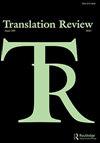Octavio Paz on Translation: Literature and Literality, translated by Lynn Tuttle
IF 0.3
3区 文学
0 LANGUAGE & LINGUISTICS
引用次数: 0
Abstract
Learning to speak is learning to translate; when the child asks his mother for the meaning of some word, what he is really asking is that she translate the new word into his vocabulary. Translation within a language is not, in this sense, essentially different from translation between two languages. The history of every nation repeats the child’s experience: even the most isolated tribe must, at some time, confront the language of an alien people. The astonishment, rage, horror, or amused perplexity we feel in response to the sounds of a language we do not know soon becomes doubt over the one we speak. Language loses its universality and is revealed as a plurality of languages, all foreign and unintelligible to each other. In the past, translation dispelled that doubt: though there is no universal language, languages form a universal society. Once certain difficulties are overcome, all can know and understand each other. And they understand each other because in different languages men always say the same things. The universality of the spirit was the answer to the confusion of Babel: there are many languages, but meaning is one. Pascal found in the plurality of religions a proof of Christianity’s truth; translation responded to the diversity of languages with the ideal of a universal intelligibility. Thus, translation was not only an extra proof but a guarantee of the unity of the human spirit. The modern age destroyed that security. When he rediscovered the infinite variety of temperaments and passions and beheld the spectacle of a multitude of customs and beliefs, man began to stop recognizing himself in other men. Until then, the savage had been an exception. It was necessary to suppress him by conversion or extermination, by baptism or the sword. But the savage who appeared in eighteenth-century salons was a new creature. Although he could speak his hosts’ language perfectly, he embodied an undeniable foreignness. He was no longer the subject of conversion but rather of argument and criticism; the originality of his judgments, the simplicity of his customs, and even the violence of his passions were proof of the madness and vanity, if not the infamy, of those baptisms and conversions. Change of direction: the religious search for a universal identity was followed by an intellectual curiosity bent upon discovering differences which were no less universal. Foreignness ceased to be an aberration and became exemplary. This exemplary quality is paradoxical and revealing: the savage was the civilized man’s nostalgia, his other self, his lost half. Translation reflected these changes: no longer did it tend to seek out the ultimate identity of man, but instead became the vehicle of his uniqueness. Its function had consisted of revealing similarities over differences; from now on, it would show that those differences were irreducible, whether describing the strangeness of the savage or of our neighbor. Doctor Johnson expressed the new attitude very well. During a trip, he wrote: “A blade of grass is always a blade of grass, whether in one country or another . . . Men and women are my subjects of inquiry; let us see how these differ from those we have left behind.” Doctor Johnson’s sentence may be interpreted two ways, and both foreshadow the double path which the modern age was to take. The first alludes to the separation between man and nature, a separation which would become opposition and combat; mankind’s new missiȯn is not salvation but rather domination over nature. The second refers to the separation between men. The world is no longer one world, an indivisible whole; it is split into Nature and Culture, and Culture is divided into cultures. There are a great奥克塔维奥·帕斯谈翻译:文学与文学
学会说话就是学会翻译;当孩子问妈妈某个单词的意思时,他真正问的是她把这个新词翻译成他的词汇表。从这个意义上讲,一种语言内的翻译与两种语言之间的翻译没有本质上的不同。每个国家的历史都在重复孩子的经历:即使是最孤立的部落,在某个时候也必须面对外星民族的语言。当我们听到一种我们不知道的语言的声音时,我们会感到惊讶、愤怒、恐惧或有趣的困惑,很快就会对我们所说的语言产生怀疑。语言失去了普遍性,表现为多种语言,所有语言都是外来的,彼此难以理解。过去,翻译消除了这种疑虑:尽管没有通用语言,但语言形成了一个通用社会。一旦克服了某些困难,所有人都可以相互了解和理解。他们相互理解是因为在不同的语言中,人们总是说同样的话。这种精神的普遍性是巴别塔困惑的答案:语言有很多种,但意义是一体的。帕斯卡在多种宗教中发现了基督教真理的证明;翻译是对语言多样性的回应,具有普遍可懂性的理想。因此,翻译不仅是一种额外的证明,而且是人类精神统一的保证。现代社会破坏了这种安全。当他重新发现了无限多样的气质和激情,看到了多种习俗和信仰的奇观时,人类开始不再在其他人身上认出自己。在那之前,野蛮人一直是个例外。有必要通过皈依或灭绝、洗礼或用剑来镇压他。但出现在十八世纪沙龙里的野蛮人是一种新的生物。尽管他能把东道主的语言说得很流利,但他身上却有一种不可否认的异国情调。他不再是皈依的对象,而是争论和批评的对象;他的判断的独创性,他的风俗习惯的简单性,甚至他的激情的暴力,都证明了这些洗礼和皈依的疯狂和虚荣,如果不是耻辱的话。方向的改变:宗教对普遍身份的追求之后是一种求知欲,这种求知欲致力于发现同样普遍的差异。主权不再是一种失常,而是一种典范。这种典型的品质是矛盾的,也是发人深省的:野蛮人是文明人的怀旧,是他的另一个自己,是他失去的另一半。翻译反映了这些变化:它不再倾向于寻找人的终极身份,而是成为他独特性的载体。它的功能包括揭示相似之处而非差异;从现在起,无论是描述野蛮人的怪异还是我们邻居的怪异,都将表明这些差异是不可减少的。约翰逊医生很好地表达了新的态度。在一次旅行中,他写道:“无论在一个国家还是在另一个国家,一片草总是一片草……男人和女人都是我的调查对象;让我们看看这些与我们留下的有什么不同。”约翰逊医生的这句话可能有两种解释,都预示着现代将走上的双重道路。第一个暗指人与自然之间的分离,这种分离将变成对立和战斗;人类的新使命不是拯救,而是统治自然。第二个是指人与人之间的分离。世界不再是一个世界,一个不可分割的整体;它分为自然和文化,文化又分为文化。有一个伟大的
本文章由计算机程序翻译,如有差异,请以英文原文为准。
求助全文
约1分钟内获得全文
求助全文

 求助内容:
求助内容: 应助结果提醒方式:
应助结果提醒方式:


